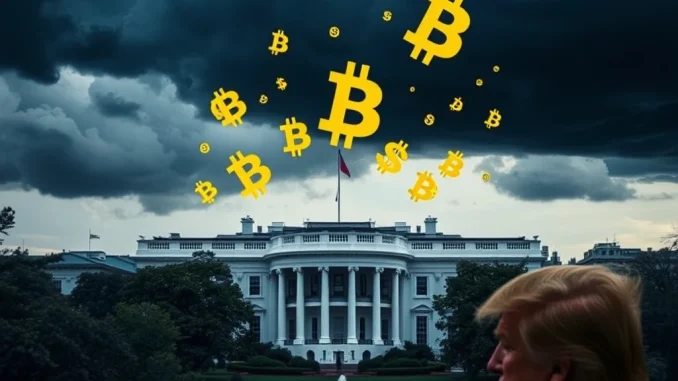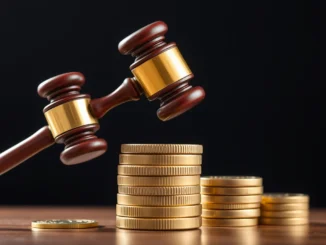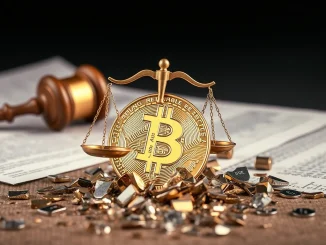
The crypto world is no stranger to volatility, but a new kind of turbulence is brewing – political risk. Investment banking giant TD Cowen has issued a stark warning, highlighting that crypto ventures linked to the Trump family could inject significant political uncertainty into the already complex landscape of U.S. crypto legislation. This development raises critical questions about the future of digital asset regulation and the potential roadblocks ahead for the industry. Let’s dive into why these Trump-associated crypto initiatives are causing concern and what it could mean for the future of crypto in the United States.
Why Trump Crypto Ventures Amplify Political Risk in Crypto?
TD Cowen’s alert shines a spotlight on the intersection of politics and cryptocurrency, a space that’s becoming increasingly intertwined. The core issue isn’t necessarily the crypto ventures themselves, but rather the political baggage they carry. Here’s a breakdown of the key concerns:
- Increased Scrutiny: Ventures associated with politically prominent figures like the Trump family inevitably attract heightened media and regulatory attention. This scrutiny can be a double-edged sword. While transparency is generally positive, intense political focus can lead to biased or overly aggressive regulatory responses.
- Partisan Divide: In a politically polarized environment, crypto initiatives linked to one side of the political spectrum can easily become partisan footballs. This could lead to legislative gridlock and make bipartisan consensus on crypto regulation even harder to achieve.
- Policy Swings: Political winds can shift rapidly. A change in administration or a shift in political priorities could drastically alter the regulatory landscape for crypto, especially if these ventures become politically contentious.
- Global Implications: U.S. crypto legislation has global ramifications. Political instability in U.S. crypto policy could create uncertainty in international markets and impact the global adoption of digital assets.
In essence, TD Cowen’s warning is about the potential for political headwinds to disrupt the progress of sensible and balanced crypto regulation in the U.S.
The Shadow of Political Backlash on Crypto Legislation US
While there’s been palpable momentum towards establishing clearer rules of the road for cryptocurrencies in the United States, this political risk factor could throw a wrench in the works. Here’s how a political backlash might manifest and impact crypto legislation US:
- Slowed Legislative Progress: Political controversy can bog down legislative processes. Instead of focusing on the merits of crypto regulation, lawmakers might get caught up in partisan debates and political maneuvering, delaying or derailing crucial bills.
- Stricter Regulations: A political backlash could push regulators to adopt a more heavy-handed approach. Fear of political fallout might incentivize regulators to impose overly restrictive rules, stifling innovation and growth in the crypto sector.
- Uncertainty for Businesses: The biggest enemy of business is uncertainty. Political volatility surrounding crypto regulation can make it incredibly difficult for companies to plan, invest, and innovate in the space. This uncertainty can drive businesses away from the U.S. and towards more welcoming jurisdictions.
- Erosion of Trust: If the public perceives crypto regulation as being driven by political agendas rather than sound policy, it can erode trust in both the regulatory process and the crypto industry itself.
The key takeaway is that political turbulence can create a less predictable and less favorable environment for the development of crypto legislation US.
Trump Crypto Ventures: What Exactly is on the Horizon?
The specific Trump crypto ventures raising eyebrows include plans for a stablecoin and other crypto-related initiatives. While details are still emerging, here’s what we know and why they are significant:
- Stablecoin Ambitions: The rumored stablecoin project is perhaps the most prominent venture. Stablecoins, designed to maintain a stable value (often pegged to the US dollar), are critical infrastructure in the crypto ecosystem. A Trump-linked stablecoin could attract significant attention, but also intense regulatory scrutiny.
- Connections to Binance and World Liberty Financial: Reports suggest discussions between Trump-linked entities and major crypto players like Binance and World Liberty Financial. These connections add another layer of complexity, given Binance’s past regulatory challenges in various jurisdictions and World Liberty Financial’s relative obscurity.
- AML Policy Concerns: TD Cowen specifically mentions concerns about potential shifts in Anti-Money Laundering (AML) policy. This is a sensitive area for crypto, as regulators are keen to ensure digital assets are not used for illicit activities. Any perceived laxity in AML compliance in Trump-linked ventures could trigger regulatory alarm bells.
It’s crucial to note that these are still early days, and the exact nature and scope of these Trump crypto ventures remain somewhat opaque. However, the mere association with the Trump name is enough to inject political volatility into the crypto regulatory equation.
Stablecoin Crypto and the Regulatory Tightrope Walk
The planned stablecoin is a focal point of concern. Stablecoin crypto projects are under intense regulatory scrutiny globally, and the U.S. is no exception. Here’s why this particular venture is particularly sensitive:
| Aspect | Potential Concerns |
|---|---|
| Scale and Reach | A stablecoin backed by a prominent political figure could quickly gain significant traction, potentially posing systemic risks if not properly regulated. |
| Political Influence | Concerns could arise about undue political influence over a critical piece of crypto infrastructure like a stablecoin. |
| Regulatory Compliance | Ensuring robust regulatory compliance, especially in areas like AML and consumer protection, will be paramount to assuage concerns and gain regulatory approval. |
| Public Perception | Public trust in a politically linked stablecoin will be crucial for its success. Any missteps or controversies could severely damage its credibility. |
Stablecoin crypto projects require a delicate balancing act – fostering innovation while mitigating risks. The political dimension adds another layer of complexity to this already challenging equation.
Navigating the Future of Crypto Ventures Amidst Political Crosscurrents
So, what does all this mean for the future of crypto ventures and the broader crypto industry? Here are some actionable insights and considerations:
- Increased Vigilance: Crypto businesses and investors need to be even more vigilant about political developments and their potential impact on regulation. Staying informed and proactive is crucial.
- Proactive Engagement: The crypto industry should actively engage with policymakers across the political spectrum to educate them about the benefits of crypto and advocate for balanced regulation.
- Focus on Compliance: Robust compliance frameworks, particularly in areas like AML and KYC (Know Your Customer), are more important than ever to build trust and mitigate regulatory risks.
- Transparency and Communication: Open and transparent communication about crypto projects and their operations can help build trust and allay concerns, especially in politically charged environments.
- Diversification of Jurisdictions: For businesses, considering diversification of operations across different jurisdictions with varying political and regulatory climates can be a prudent risk management strategy.
The intersection of politics and crypto is likely to become increasingly prominent. Navigating this complex landscape will require strategic thinking, proactive engagement, and a commitment to responsible innovation.
Conclusion: Political Risk – The New Frontier for Crypto Challenges?
TD Cowen’s warning serves as a crucial reminder that the path to mainstream crypto adoption is not just about technological innovation and market dynamics. Political factors, especially political risk crypto, are emerging as a significant force shaping the industry’s trajectory. The Trump crypto ventures are a case in point, highlighting how political affiliations can inject volatility and uncertainty into the regulatory landscape.
As the crypto industry matures, it must learn to navigate these political crosscurrents effectively. This means building bridges with policymakers, fostering public trust, and demonstrating a commitment to responsible innovation. The future of crypto regulation in the U.S., and potentially globally, may well depend on how skillfully the industry can manage the rising tide of political risk.




